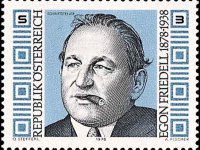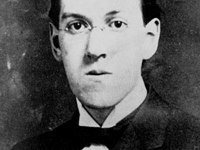
Karl Georg Büchner (1813-1837)
On February 19, 1837, German dramatist, revolutionary, natural scientist, and writer Georg Büchner passed away at age 23. His literary achievements, though few in number, are generally held in great esteem in Germany and it is widely believed that, had it not been for his early death, he might have joined such central German literary figures as Johann Wolfgang von Goethe [5] and Friedrich Schiller [6] at the summit of their profession. I admit, I have a passion for literature. Especially German literature since German is my native language. But with Büchner I never became friend. I remember that we have read his drama ‘Woyzeck‘ back in high school. It is so pessimistic and depressive – of course it ends with the suicide of the protagonist – you will probably like it only if you are some kind of goth…
Georg Büchner – Youth and Education
Georg Büchner was born in Goddelau (now part of Riedstadt) in the Grand Duchy of Hesse as the son of a physician. He attended a humanistic secondary school in Darmstadt that focused on modern languages including French, Italian and English. In 1828, he became interested in politics and joined a circle of William Shakespeare aficionados which later on probably became the Gießen and Darmstadt section of the “Gesellschaft für Menschenrechte” (Society for Human Rights). In 1831, at age 18, Büchner began to study medicine in Strasbourg. In Strasbourg, he immersed himself in French literature and political thought. He was influenced by the utopian communist theories of François-Noël Babeuf and Claude Henri de Saint-Simon.
“Peace to the hovels! Death to the palaces!” Georg Büchner, Der Hessische Landbote, 1834
Toward Practical Medicine
During this period he became engaged to Luise Wilhelmine, daughter of the pastor Johann Jakob Jaeglé, in whose home he resided. In Hessen’s state university in Gießen, he turned above all toward practical medicine, and here also came in contact with republican and early socialist groups. There, he met the evangelical theologian Friedrich Ludwig Weidig, who, after the study of theology had founded the “German Society” in Butzbach and as the rector of the municipal school had become an integrating figure in the upper Hessen opposition. While Weidig endeavored to support the parliamentary opposition by exposure of responsibility for various mistakes, lies, and abuses, Büchner focused his attention on the problematical monarchical principle, that the liberals only half-heartedly opposed [2]
“The political state of affairs drives me mad. The poor people patiently pull the cart on top of which the princes and the educated act out their bizarre comedy.” Georg Büchner, letter to a friend, 1833
Charged with Treason
In July 1834, with the help of Weidig, Büchner anonymously published the leaflet Der Hessische Landbote (The Hesse Country Messenger), a revolutionary pamphlet critical of social injustice in the Grand Duchy of Hesse. Its radicalism promoted a comprehensive appraisal of contemporary social conditions. The campaign failed: the peasants were too frightened to hold on to the pamphlets and handed them over to the police, for penalties for subversive activities often led to ruin.[3] The authorities charged them with treason and issued a warrant for their arrest. Weidig was arrested, tortured and later died in prison in Darmstadt.
“There are people here who predict a splendid future for me. I have no objection.” Georg Büchner in a letter to his family, Strassbourg, 1835
Straßbourg, Zürich, and Typhus
In 1835, Büchner managed to flee across the border to Strasbourg where he resolved to continue his medical studies and wrote most of his literary work. He lived on the proceeds from the translation of two plays by Victor Hugo – Lucrèce Borgia and Marie Tudor – [7] and some financial support from his father, who was deeply worried at the direction which his son had taken.[3] In October 1836, after receiving his M.D. with the dissertation “Mémoire sur le Système Nerveux du Barbeaux (Cyprinus barbus L.)” , and being appointed by the University of Zürich as a lecturer in anatomy, Büchner relocated to Zürich where he spent his final months writing and teaching until his death from typhus at the age of twenty-three.
Recognizing Büchner’s Genius
Büchner’s fame and importance was largely determined by the politicalization of his thought. Left radical critics in particular praised his works as early socialist engaged poetry.[2] In Darmstadt shortly before his exile in Strassbourg, Büchner wrote Danton’s Death, a drama on the French revolution suffused with deep pessimism, under great pressure in less than five weeks while he was under close police surveillance for his political activities. Its protagonist, the revolutionary Danton, is shown as a man deeply distraught at the bloodshed he had helped unleash.[1] Büchner wrote it in haste and secrecy, his dissection table serving him as a writing desk, which he quickly covered with medical papers in order to hide the manuscript from his father. On completion in February 1835 he sent it to the well-known literateur Karl Gutzkow, who immediately recognised Büchner’s genius and arranged publication as early as July 1835, although for fear of censorship, in a bowdlerised version. Danton’s Death is Büchner’s only work that was published in his life time.[3]
Lenz and Woyzeck
Next followed Lenz (first partly published in Karl Gutzkow’s and Wienberg’s Deutsche Revue, which was quickly banned). Lenz is a novella based on the life of the Sturm und Drang poet Jakob Michael Reinhold Lenz. In 1836 his second play, Leonce and Lena, is a satire on the nebulous nature of Romantic ideas, shows the influence of Alfred de Musset and Clemens Brentano. His unfinished and most famous play, Woyzeck, was notable because its main characters were all from the working class. It anticipated the social drama of the 1890s with its compassion for the poor and oppressed. Except for Danton’s Death, not produced until 1902, Büchner’s writings appeared posthumously, the fragmentary Lenz in 1839 and Woyzeck not until 1879.
Naturalism and Expressionism
Büchners philosophy of character betrays his own struggles coming of age in Germany during the revolutionary rumblings of the 1830s and his inability to achieve literary success during his short lifetime. “Individuals,” he wrote, “are so much surf on a wave, greatness the sheerest accident, the strength of genius a puppet play–a child’s struggle against an iron law.“[4] Today, Büchner is considered a forerunner of both naturalism and expressionism.
References and further Reading:
- [1] Georg Büchner, German dramatist, at Britannica Online
- [2] James Chastain: Georg Büchner, at Ohio State University
- [3] Peter Gill: Georg Büchner
- [4] Georg Büchner, at Imagi-Nation
- [5] The Life and Works of Johann Wolfgang von Goethe, SciHi Blog, August 28, 2012.
- [6] ‘Art is the Daughter of Freedom’ – Friedrich Schiller, SciHi Blog, May 9, 2012.
- [7] The Writings of Victor Hugo, SciHi Blog, May 22, 2017.
- [8] Georg Büchner at Wikidata
- [9] Timeline for Georg Büchner, via Wikidata






Thank you for the kind mention of Georg Büchner. But you do not even mention his scientific interests, and may be, that`s the reason, why you never became friend? I could find the text of his sensational research online in german only:
http://buechnerportal.de/aufsaetze/38-einleitung-zu-memoire-sur-le-systeme-nerveux-du-barbeau-cyprinus-barbus-l-abhandlung-ueber-das-nervensystem-der-barbe/
May be that opens your mind for his life and work. Imagine: his interest was allways to understand, “what makes us to do and to let”
Thanks a lot for that link! I will have a look 😉
Best regards,
Harald
by the way: this picture doesn`t show him …
http://geschwisterbuechner.de/2014/01/06/jenseits-des-revolutionaers/
Thanks a lot for the hint. We’ve changed the picture accordingly.
Best regards,
Harald